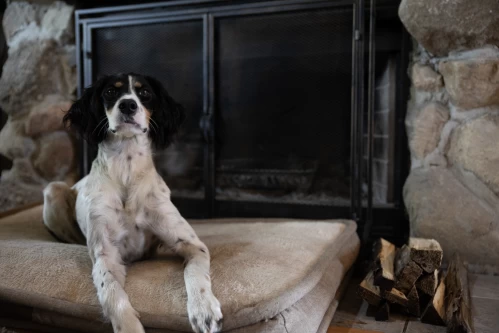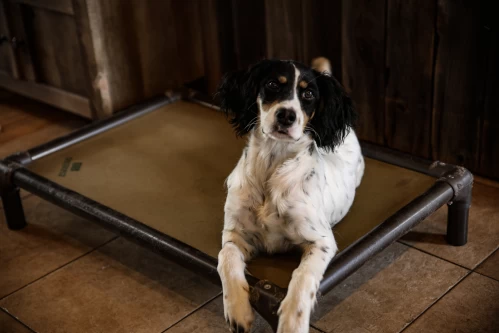How to Stop My Dog Whining and Barking when Place Training?
Follower's Question: My family recently got a place training cot for our 12 week old redbone coonhound. He does extremely well while we try to place train with the leash on him. When we take the leash off he will stay on the bed, but he howls/barks and gets worked up/anxious. Our home can be chaotic with the many distractions from our toddler and 12 year old. Any advice for curbing this or am I just expecting to much from such a young pup? He listens very well to me, but sometimes doesn't want to listen to the rest of my family. He is going to be a family dog first and foremost, but I plan to start training him this spring/summer for tracking whitetail/shed hunting here in PA and MD. I didn't keep a liver this fall because my boys didn't have us talked into a puppy yet, but plan to buy your kit here soon when our weather breaks. I have learned so much from your videos and am grateful that there are people like you at dogbone that put such good content out.
Thanks!

Jeremy's Answer: Thanks for the message and support. I think every dog is a little different in how they progress when it comes to everything. Place training is the same thing. As I write this message back, I am listening to a 8.5 week old lab pup whine, fuss and occasionally bark on his place. He started place training about a week ago and was almost perfect right from the start. He's just taking a few steps back and regressing as he "tests" what he can and can't get away with. I tolerate the noise so long before I make a decision on whether or not to correct. No two days are the same, but eventually I do think he will settle in and likely be a very quiet, cooperative pup in the long run. In fact, he just layed down and looks to be closing his eyes. That's where patience comes in as handlers. We need to be willing to suck it up and take the undesired behavior at times and other times we need to correct it. All based on us determining whether or not the pup know what is "right" or "wrong". That too is where consistency on our part is so important. I've seen this pup whine and fuss on place and then realize, he might have to go to the bathroom? I take him out and he goes, comes back in and lays down quietly. I've also seen it where he is fussy on place and the reality is he's a pup and full of piss and vinegar and simply needed to be taken out to move about and burn some energy. Each situation is specific and you need to determine the little factors that impact the big picture behavior.
 More specifically with your dog, it's great that he does well on the lead, but now its time to take another step. How long does the dog make the fuss? Does he ever settle or do you take him off or do something before he gets to that point. If so, he's trained you guys to do what he wants. I've invested in good quality ear plugs at our place. Sometimes it helps to get past their fits. Once they settle, I let them know they are good and we may end up restarting the whole thing again. Most the time, if were consistent this is a way the dog starts to learn that fussing doesn't get the attention, and the beds not that bad of a place to just relax. I've also had times that the pup is literally talking back to me (in a bad way) when they start barking and fussing. In those moments, I've walked over to the bed calmly but assertively, reached down and grabbed the pup by the scruff of the neck. A quick shake and a growly "NO" and then turn and leave the pup. That has been the answer more than one time. Like I said, there's no black and white answer all the time. Instead, you have to do something and see how the dog responds. Based on that you do something else. Always keeping in mind that there are a lot of variables. You named several in recognizing that you have a chaotic house at times. That makes the job harder so maybe the first thing to do is work on the skill when the chaos doesn't exist and slowly add in the distractions once the behavior is understood.
More specifically with your dog, it's great that he does well on the lead, but now its time to take another step. How long does the dog make the fuss? Does he ever settle or do you take him off or do something before he gets to that point. If so, he's trained you guys to do what he wants. I've invested in good quality ear plugs at our place. Sometimes it helps to get past their fits. Once they settle, I let them know they are good and we may end up restarting the whole thing again. Most the time, if were consistent this is a way the dog starts to learn that fussing doesn't get the attention, and the beds not that bad of a place to just relax. I've also had times that the pup is literally talking back to me (in a bad way) when they start barking and fussing. In those moments, I've walked over to the bed calmly but assertively, reached down and grabbed the pup by the scruff of the neck. A quick shake and a growly "NO" and then turn and leave the pup. That has been the answer more than one time. Like I said, there's no black and white answer all the time. Instead, you have to do something and see how the dog responds. Based on that you do something else. Always keeping in mind that there are a lot of variables. You named several in recognizing that you have a chaotic house at times. That makes the job harder so maybe the first thing to do is work on the skill when the chaos doesn't exist and slowly add in the distractions once the behavior is understood.
I know its a long answer with no specific "do this", but that's raising a dog. Above all, stay patient and keep moving. You'll find small successes that you can build off of.
Best of luck,
Jeremy
For Products: DB Store
Video Dog Training: DB Training Library
Dog Training Podcast: The DogBone Podcast

 About
About Reviews
Reviews Free Videos
Free Videos Journal
Journal Podcast
Podcast

%COMMENTS%